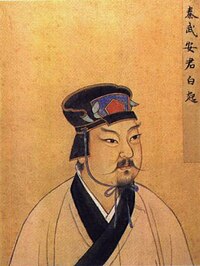Bai Qi
| Bai Qi | |
|---|---|

A Ming dynasty portrait of Bai Qi
|
|
| General of the Qin state | |
| Born | (unknown) |
| Died | 257 BC |
| Names | |
| Traditional Chinese | |
| Simplified Chinese | |
| Pinyin | Bái Qǐ |
| Wade–Giles | Pai Chi |
Bai Qi (died 257 BC), also known as Bo Qi, was a military general of the Qin state in the Warring States period of Chinese history. Born in Mei (now Mei County in Shaanxi Province), as commander of the Qin army for more than 30 years, Bai Qi was responsible for the deaths of a total of between 890,000 and 2,000,000 enemy soldiers, earning him the nickname Ren Tu (人屠, human butcher). He seized more than 73 cities from the other six Warring States in the Warring States Period and to date no record has been found to show that he suffered a single defeat throughout his military career. He was named by Chinese historians as one of the four greatest generals of the Warring States period, along with Li Mu, Wang Jian and Lian Po.
He was promoted from Zuo Shu Zhang(左庶長, vice prime minister of Qin) to Da Liang Zao(大良造, prime minister of Qin) by King Zhaoxiang of Qin. He had commanded wars against the states of Han, Wei, Zhao and Chu, seizing large areas of territory. In 278 BC, he led the Qin army to capture Ying, the capital city of Chu. As a reward, he was given the title Lord Wu'an (武安君, literally: lord of martial peace).
During the Battle of Changping in 260 BC, he succeeded Wang He as the commander of Qin army, and soon defeated the Zhao army commanded by Zhao Kuo. The Zhao army was split into two parts and its supply lines and retreat route cut off by Bai Qi. More than 400,000 Zhao soldiers, including the Shangdang people who surrendered after Zhao Kuo was shot dead by Qin archers, were slain(坑殺buried alive) on the orders of Bai Qi.
...
Wikipedia
